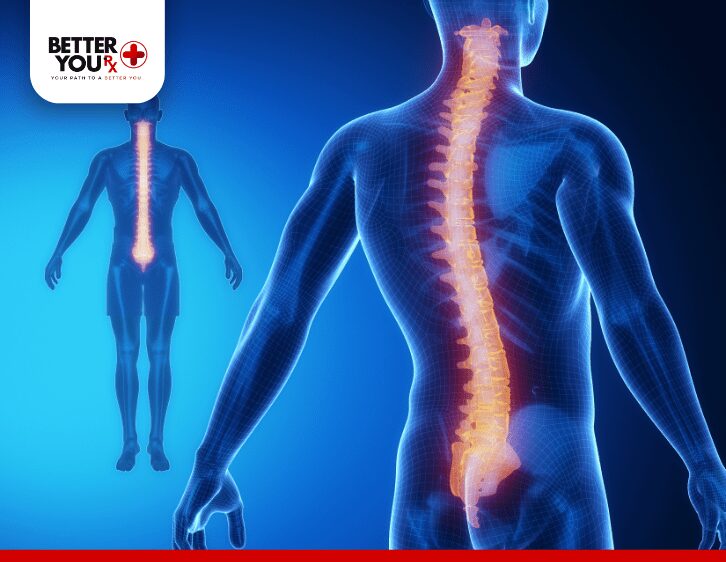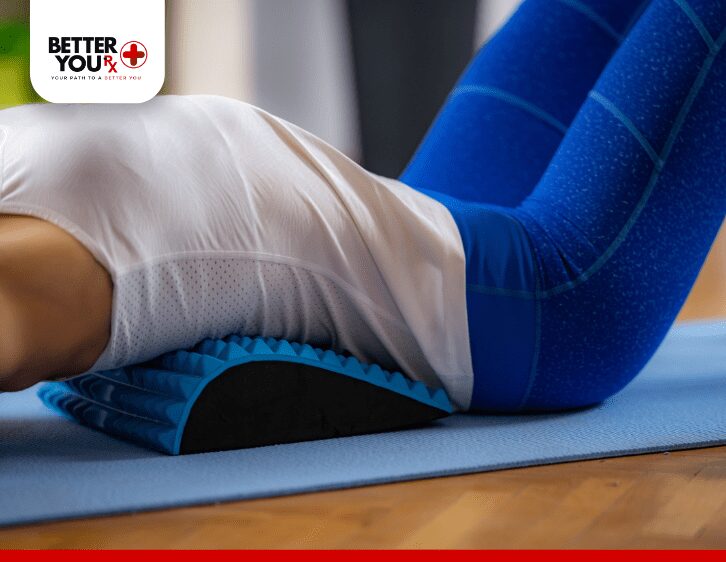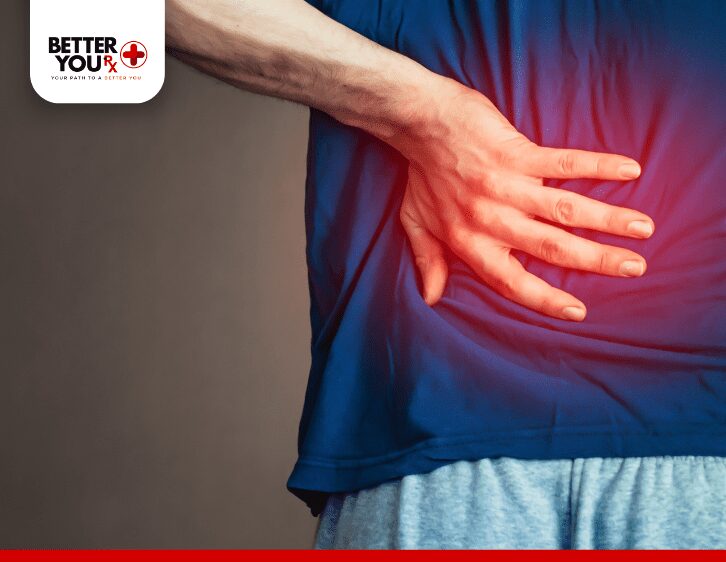Obesity, a significant health challenge affecting millions worldwide, extends its impact far beyond the commonly recognized risks of cardiovascular disease and diabetes. One of the critical yet often overlooked consequences of excessive body weight is its impact on spinal health, particularly the strain it places on the spine and the resulting lower back pain. This article delves into how obesity affects the spine, explores the mechanisms behind this strain, and discusses strategies for managing weight to alleviate lower back pain.
The Spine: Structure and Function

To understand the impact of obesity on spinal health, it is essential to first appreciate the spine’s intricate structure and its role in the body. The spine, or vertebral column, is a bony structure that extends from the base of the skull to the pelvis. It is composed of 33 vertebrae, which are divided into five regions: cervical (neck), thoracic (mid-back), lumbar (lower back), sacral (pelvic region), and coccygeal (tailbone). Each vertebra is cushioned by intervertebral discs, which act as shock absorbers and allow for flexibility and movement.
The spine supports the body’s weight, protects the spinal cord, and provides structural integrity to the torso. It also facilitates movement, including bending, twisting, and lifting. The lumbar region, in particular, bears a significant portion of the body’s weight and is subject to considerable stress during daily activities. When additional weight is added, especially excess body fat, the demands on the lumbar spine increase substantially.
How Obesity Affects the Spine
Increased Load on the Lumbar Spine
Obesity contributes to the strain on the lumbar spine in several ways. The most direct impact is the increased load placed on the lumbar vertebrae. The lumbar region, which consists of five vertebrae (L1-L5), is responsible for bearing much of the body’s weight. When an individual is overweight or obese, this additional weight can exacerbate the stress on the lumbar spine.
Excess body fat accumulates not just around the abdomen but also within the deep abdominal cavity. This visceral fat increases the load on the spine and can lead to an imbalance in the body’s center of gravity. The result is increased pressure on the lumbar vertebrae and intervertebral discs, which can accelerate the degeneration of these structures and lead to various spinal issues, including disc herniation and chronic lower back pain.
Degeneration of Intervertebral Discs
Intervertebral discs are essential for maintaining spinal flexibility and cushioning the vertebrae. Each disc consists of an outer layer called the annulus fibrosus and an inner gel-like substance called the nucleus pulposus. These discs absorb shock and distribute loads evenly across the spine. However, when subjected to excessive weight, the discs experience increased pressure, which can lead to their deterioration over time.
Obesity accelerates the degeneration of intervertebral discs in several ways:
Increased Pressure: The additional weight causes higher pressure on the discs, leading to their gradual breakdown.
Reduced Nutrient Supply: Degenerative discs often suffer from reduced blood supply, which impairs their ability to receive essential nutrients and maintain hydration.
Height Loss: Degenerative discs lose height, reducing the space between the vertebrae and increasing the risk of nerve compression.
The deterioration of intervertebral discs can result in conditions such as disc herniation or bulging. A herniated disc occurs when the inner gel-like substance protrudes through a tear in the outer layer, potentially compressing nearby nerves and causing pain that radiates into the lower back and legs.
Weakened Core Muscles
Another critical aspect of spinal health affected by obesity is the weakening of core muscles. The core muscles, which include the abdominal muscles, obliques, and lower back muscles, play a vital role in stabilizing and supporting the spine. Strong core muscles help maintain proper posture and reduce the strain on the vertebrae and intervertebral discs.
In individuals with obesity, excess body fat, particularly in the abdominal region, can lead to weakened core muscles. This muscle weakness results in:
Reduced Spinal Support: Weakened core muscles fail to provide adequate support to the spine, leading to increased strain on the vertebrae and discs.
Poor Posture: Excess abdominal fat can cause a forward-leaning posture, which places additional stress on the lumbar spine and exacerbates lower back pain.
Impaired Balance: Weak core muscles contribute to poor balance and stability, increasing the risk of falls and injury, which can further impact spinal health.
Abnormal Posture and Spinal Alignment
Obesity often leads to abnormal posture and misalignment of the spine. Excess weight, especially in the abdominal region, can cause a condition known as excessive lumbar lordosis. This condition is characterized by an exaggerated inward curve of the lower back. The resulting poor posture can place additional stress on the lumbar vertebrae and exacerbate spinal discomfort.
Poor posture and spinal misalignment can contribute to:
Increased Spinal Curvature: Excessive lumbar lordosis can result in increased spinal curvature, leading to muscle imbalances and chronic back pain.
Misaligned Vertebrae: Abnormal posture can cause misalignment of the vertebrae, which can irritate spinal nerves and lead to pain.
Joint Stress: Misalignment can place undue stress on the facet joints of the spine, leading to inflammation and discomfort.
Understanding the Connection Between Obesity and Lower Back Pain
Lower back pain is a common complaint, especially among individuals who are overweight or obese. The connection between these two conditions is significant and multifaceted. Excess weight can place considerable stress on the spine, resulting in various issues that contribute to discomfort and pain.
The Impact of Excess Weight
Increased Pressure: Carrying extra pounds causes the spine to work harder to support the body. This increased pressure can lead to wear and tear on the discs between the vertebrae, accelerating their degeneration.
Altered Posture: Obesity often results in a change in posture. A protruding stomach can pull the spine forward, causing additional strain on the lower back and contributing to pain.
Inflammation: Studies have shown that obesity is linked to chronic inflammation, which can affect the tissues surrounding the spine. This inflammation can lead to pain and stiffness in the lower back.
Weak Core Muscles: A weak core makes it challenging for the spine to maintain proper alignment. This misalignment can place extra stress on the lower back muscles, leading to pain and discomfort.
The Consequences
Herniated Discs: The increased pressure on the spine can cause the discs between the vertebrae to bulge or rupture. This can compress nerves and result in pain, numbness, or weakness in the legs.
Osteoarthritis: Over time, the constant stress on the spine can contribute to osteoarthritis, a degenerative condition affecting the cartilage in the joints. This condition may lead to discomfort, stiffness, and a decreased range of motion.
Managing Obesity to Alleviate Lower Back Pain
Addressing obesity is crucial for alleviating the strain on the spine and managing lower back pain. A comprehensive approach to weight management can significantly improve spinal health and overall well-being. Here are several strategies for managing obesity and reducing lower back pain:
Weight Loss Through Diet and Exercise
A balanced diet and regular exercise are fundamental components of effective weight management. Adopting a healthy eating plan that emphasizes whole foods, such as fruits, vegetables, lean proteins, and whole grains, can help promote weight loss. Reducing the intake of processed foods, sugary beverages, and high-fat snacks can also contribute to weight reduction.
Exercise plays a critical role in weight management and spinal health. Engaging in regular physical activity helps burn calories, build muscle, and improve overall fitness. Low-impact exercises, such as walking, swimming, and cycling, are particularly beneficial for individuals with back pain. Strength training exercises, focusing on the core and lower back muscles, can enhance spinal stability and reduce discomfort.
Physical Therapy and Rehabilitation
Physical therapy is an effective intervention for managing lower back pain associated with obesity. A physical therapist can design a personalized exercise program that targets the core muscles, improves posture, and enhances spinal stability. Physical therapy may include:

Strengthening Exercises: Exercises that focus on building strength in the core, back, and leg muscles can help support the spine and reduce pain.
Stretching and Flexibility: Stretching exercises can improve flexibility and relieve tension in the muscles surrounding the spine.
Postural Training: Physical therapists can provide guidance on maintaining proper posture and alignment to reduce strain on the spine.
Medical Interventions
In some cases, medical interventions may be necessary to address obesity-related lower back pain. These interventions can include:
Medications such as pain relievers, anti-inflammatory agents, or muscle relaxants might be recommended to alleviate pain and inflammation.
Weight Loss Medications: Prescription medications may be recommended to support weight loss efforts, particularly when lifestyle changes alone are insufficient.
Surgical Options: For individuals with severe obesity or significant spinal issues, surgical options such as bariatric surgery may be considered to promote weight loss and improve spinal health.
Lifestyle Changes
In addition to dietary and exercise modifications, incorporating healthy lifestyle changes can support weight management and spinal health. These changes may include:
Regular Sleep Patterns: Ensuring adequate and restful sleep is essential for overall health and can aid in weight management.
Stress Management: Utilizing relaxation methods like meditation or deep breathing can help mitigate emotional eating and support weight loss efforts.
Hydration: Drinking plenty of water can help maintain proper hydration and support metabolic processes.
Better You Rx: Supporting Your Journey to Better Health
Obesity places a significant strain on the spine, leading to various complications such as increased pressure on the lumbar vertebrae, weakened core muscles, and altered posture, all of which contribute to lower back pain. Understanding the intricate connection between excess weight and spinal health is crucial for developing effective strategies to alleviate discomfort and improve overall well-being.
Addressing obesity through a multifaceted approach—comprising dietary changes, regular exercise, physical therapy, and medical interventions—is essential for managing spinal strain and reducing lower back pain. Lifestyle modifications and professional guidance can play a pivotal role in achieving and maintaining a healthy weight, thus alleviating the pressure on the spine and enhancing quality of life.
Better You Rx is dedicated to supporting your weight-loss journey by providing a range of medications designed to assist in managing obesity. One effective option to consider is Wegovy, a prescription medication that targets the hormones regulating appetite and satiety. Incorporating Wegovy into your weight-loss plan can complement dietary changes and physical activity, helping you achieve meaningful and sustainable results.
Explore our selection of weight-loss medications and discover how Wegovy can be a valuable part of your journey. Shop our products at Better You Rx and take the first step towards a healthier, pain-free future today.



